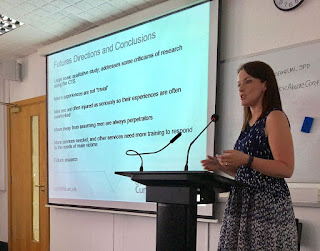How can we utilise research to inform practice?
 |
| Dr Elizabeth Bates |
Within the field of intimate
partner violence research, there are two competing theoretical perspectives:
the feminist perspective (which sees men’s violence as a problem motivated by
male privilege and patriarchy, with the majority of victims being female) and
the family violence perspective (which sees violence as a family problem and
one where there are few gender differences in experience).
Within the research area, there
is a huge amount of research that has supported the family violence approach
including research that details women’s violence and controlling behaviour
(e.g. Bates, Graham-Kevan & Archer, 2014), the high prevalence of
bidirectional/mutual violence (e.g. Langhinrichsen-Rohling et al., 2012) and a
wealth of literature that details the similarity in male and female
perpetrators (e.g. Bates, Archer & Graham-Kevan, 2017).
In contrast, the research
supportive of the feminist theory tends to rely on selective clinical samples
(e.g. women in shelters, men in prisons), and does not utilise appropriate or rigorous
methodology. Currently in practice, many
interventions and programmes are heavily influenced by this feminist model. The
Duluth Model utilises the Power and Control Wheel
at the heart of its curriculum. Rather
than being therapeutic, it is psycho-educational and works to re-educate men
about their violence by asking them to confront their patriarchal values and
male privilege.
Research suggests that
Duluth based interventions are not effective (e.g. Babcock et al., 2003), and many
academics recommend a movement away from these approaches and accreditation
systems (e.g. Dixon et al., 2012). There
is a need for evidence based practice to inform the development of alternative
programmes. But, how can we ensure that practice is informed by current,
methodologically rigorous research? What are the barriers to this research
penetrating the realms of policy and practice?
Academics have a duty to go
out into the environments where their research is likely to impact. For a
researcher in this area, this means working with agencies, communicating
findings to practitioners and engaging the public in our research findings. This
is highlighted in the upcoming Research Excellence Framework (REF) where institutions and academics are credited for the
impact that their research has beyond academia.
I endeavour to disseminate
my findings in this way. In a recent study, myself and my colleagues sought to
explore what IPV perpetrator programmes were provided within the UK (that has
been published in Partner Abuse this year).
We found that the majority of provision was still aimed at men who had
abused their female partners. There were
still strong influences of the Duluth/feminist model, often mixed with some CBT
approaches too. We found that not all providers were collecting data for
evaluation, or engaging with external agencies to measure effectiveness. Within this review, we as a team concluded
that the Duluth model is still very influential within practice in the UK. It is something that is significantly
impeding practice moving forward in terms of reducing IPV offending. We call
for more evidence based practice within the area and an end to the “immunity”
the model seems to have from needing to answer to any external empirical
evaluation (Corvo, Dutton & Chen, 2008; p.112).
We disseminated our findings
through the usual academic publication process but I also presented at several
conferences including one aimed at UK forensic academic and practitioners (see
photo below of me with my symposium team) and a US based conference of
practitioners. It is so important for academics to share their findings beyond
the academic arena, especially when many practitioners and organisations do not
subscribe to the journals we often publish in. In my experience at the
conference, I was given some good feedback but also, I had challenged some
people’s perceptions and this may go on to have an impact in their practice in
some (possibly small) way.
 |
| Liz presenting at the 2016 BPS Division of Forensic Psychology Conference in Brighton |
Similarly, although to a
different type of audience, I was invited to speak at the ManKind Initiative annual conference where I was asked to talk about the
research on male victims of partner violence. To this type of audience I didn’t
have to try and convince them that women could be violent, or that current
practice was not supporting all victims. Instead I was able to give academic
research as a source of evidence to support what many of these practitioners
already knew (see photo below from the conference).
I still reflect on this and
feel there is more I could do to engage with practitioners; especially those
who don’t attend conferences or actively seek to keep abreast of current
research developments. There is a need
for a mutual dialogue – yes research should inform practice but equally
researchers should engage with practitioners and understand their role and
experience. With politics, funding cuts and accreditation processes, it is
important to recognise that practitioners may not always have freedom to
implement evidence based change. For
effective reduction of partner violence, there is a need to fully tackle this
research-practice nexus.
 |
| Liz presenting at the 2016 ManKind Conference in Walsall |
Dr Elizabeth Bates is one of our senior lecturers. If you would like to contact her, you can do so on: Elizabeth.Bates@cumbria.ac.uk
You can also follow her on Twitter


Thank you for a thoughtful and considered blog. How we can become more integrative with local service providers and practitioners seems crucial in opening wider the dialogue and contrasting perspectives...
ReplyDeleteThanks as always for your contribution to this area of understanding and shared knowledge Liz. I always enjoy reading what your research has suggested and I think it is extremely important for practitioners to understand and value the different sides IPV encompasses.
ReplyDelete